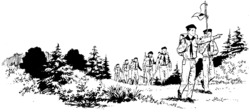 If there’s one thing that Scouting does thoroughly for its adult volunteers (besides handbooks and publications, that is), it’s training.
If there’s one thing that Scouting does thoroughly for its adult volunteers (besides handbooks and publications, that is), it’s training.
There are all manner of courses for training every volunteer position, from den leader to council chairman. Basic training courses are offered online and in person for unit positions – a first exposure to adult leadership at the pack and troop level. In-depth seminars and specialty classes at events like Pow-Wow and University of Scouting expand on that knowledge. High-level courses such as Wood Badge and Advanced Backcountry Leadership Experience put Scouters through the wringer. For the serious volunteer, there are week-long courses at Philmont that offer something for everyone.
Yes, the BSA is big on training – make no mistake about it. Continue reading “The “what” comes immediately. The “why” takes longer.”


 If you’re a regular viewer of the CBS show 60 Minutes, you probably caught the remarkable
If you’re a regular viewer of the CBS show 60 Minutes, you probably caught the remarkable  Boy Scout troops don’t seem to have the same drought of willing adult helpers as Cub Scout packs do, but they still need a few to serve in roles supporting the Scouts in running their troop, and a few more to help with the support tasks that the Scouts can’t do for themselves. Still others are needed to serve on boards of review and to drive Scouts to and from their campouts.
Boy Scout troops don’t seem to have the same drought of willing adult helpers as Cub Scout packs do, but they still need a few to serve in roles supporting the Scouts in running their troop, and a few more to help with the support tasks that the Scouts can’t do for themselves. Still others are needed to serve on boards of review and to drive Scouts to and from their campouts. You know the routine. It happens every month.
You know the routine. It happens every month. Suppose that instead of a usual weekend campout, the Scouts of your troop have decided to go on a weekend hike – maybe to get a taste of what a longer voyage like a Philmont trek might be like.
Suppose that instead of a usual weekend campout, the Scouts of your troop have decided to go on a weekend hike – maybe to get a taste of what a longer voyage like a Philmont trek might be like.